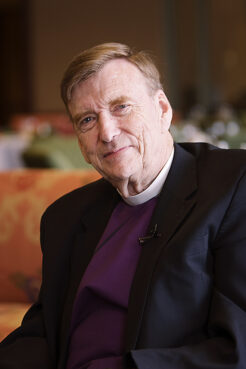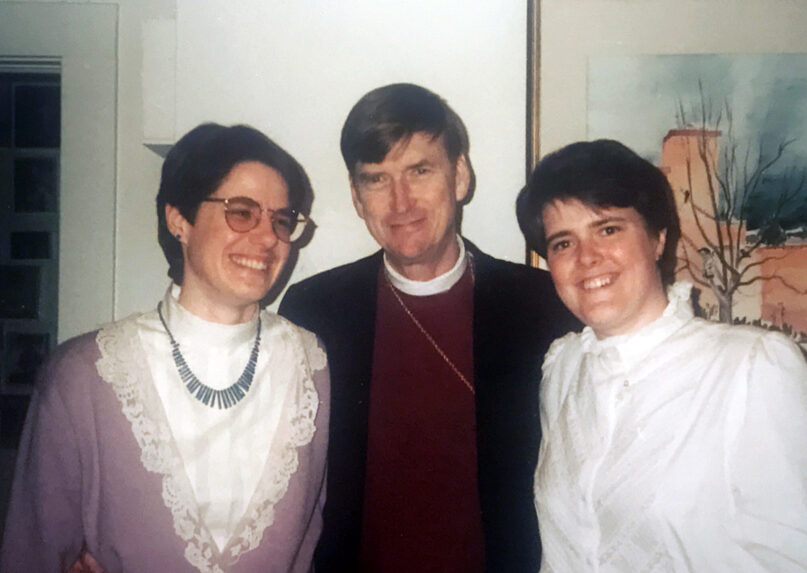(RNS) — I was two months into my first job as a freshly ordained deacon in an Episcopal church outside of Newark, New Jersey, when a diocesan official let me know that I was overdue for the customary new-clergy-in-the-diocese meeting with the bishop.
I had been hesitant to meet Bishop John Shelby “Jack” Spong, who died Sunday (Sept. 12) at the age of 90, because I was afraid that my time in the Diocese of Newark — and perhaps my dream of ordination to the priesthood — would quickly end when I shared with him that I was a lesbian. I need not have worried: He ordained me to the priesthood without delay.
The Diocese of Newark, where Jack served as bishop for 24 years, was an exciting place to be in the mid-1980s, in part because of how he saw his role. “If the church is here,” he would say, holding one hand somewhere to the right, “I think the bishop needs to be here,” stretching far to the left. “That’s so the clergy have a lot of room to exist in here,” he would finish, as he waved his hand across the expanse in between.
And “exist” we did, as we wrestled with foundational theological concepts and strongly held beliefs that were all over the map. It was impossible not to be formed in some way by Jack if you were a priest in his diocese in those days.
RELATED: Bishop John Shelby Spong, firebrand who championed LGBTQ inclusion, has died
The space he created for stretching boundaries was not only theoretical. One day Jack called to invite me to dinner when a notoriously conservative bishop was going to be in town. “He doesn’t believe that women should be priests,” Jack said, “so I’m going to make sure you’re seated together and you will change his mind!” (Alas, I didn’t.)

Bishop John Shelby Spong in 2006. Photo by Scott Griessel/Wikipedia/Creative Commons
Jack enjoyed entertaining and found many opportunities to gather friends, colleagues, visiting bishops and guest lecturers for meals, at home or at a restaurant. He loved to tell stories about his cooking prowess, and about the new skills he was gaining in the kitchen. We laughed when he told us the story of how he learned that potatoes needed to be poked before baking — and the lengthy cleanup that taught him why.
When Jack’s first wife died, in 1988, a group of young clergy got together and decided to form an ad hoc support group for him. We called ourselves the Bishop’s Relief Association (the acronym was BRA; we gathered for uplift and support) and we devised wild and crazy plans to help distract him from his loss. (He drew the line at a hot air balloon ride). Mostly it involved the good food and lively conversation that were another facet of his ministry.
That same year, when my partner, Becky, and I felt ready to make a lifelong commitment to each other, we approached Jack about officiating at a commitment service we were planning. Would he be willing to officiate at a lesbian or gay couple’s union? There certainly weren’t many priests who would in those days, let alone bishops of the church. But several months later, with 60 of our friends and family as witnesses, he officiated at his first commitment service and blessed our union.
RELATED: Bishop Spong: Theology without limit or bound
The public picture of Jack can be skewed by his sometimes radical theology; he’s sometimes seen as seeking notoriety more than pastorality. But some years after I left the Diocese of Newark for a church in the Midwest, Becky’s mother was murdered. Jack, who had checked in frequently on the couple he’d married, walked that journey with us, too, calling us within hours of our arrival at Becky’s mother’s home, and remembering to call on the anniversary of her death for years to come.
I remember what my job search was like when I was getting ready to graduate from seminary. As a woman, and a lesbian, I knew I would need a supportive bishop if I had any hope of ordination and in 1985 those bishops were hard to come by. What I never imagined was that in addition to a supportive bishop I would get such a courageous, pastoral and deeply faithful mentor and friend, too. For Jack Spong I will always be grateful.
(The Rev. Cynthia Black is rector of the Church of the Redeemer in Morristown, New Jersey. The views expressed in this commentary do not necessarily reflect those of Religion News Service.)





